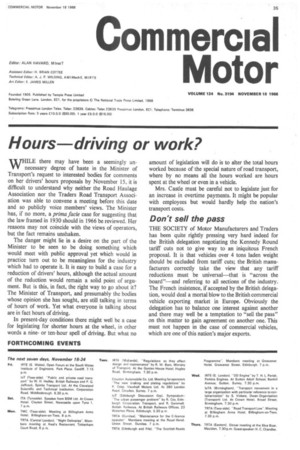Hours driving or work?
Page 37

If you've noticed an error in this article please click here to report it so we can fix it.
ILE there may have been a seemingly un
necessary degree of haste in the Minister of Transport's request to interested bodies for comments on her drivers' hours proposals by November 15, it is difficult to understand why neither the Road Haulage Association nor the Traders Road Transport Association was able to convene a meeting before this date and so publicly voice members' views. The Minister has, if no more, a prima facie case for suggesting that the law framed in 1930 should in 1966 be reviewed. Her reasons may not coincide with the views of operators, but the fact remains unshaken.
The danger might lie in a desire on the part of the Minister to be seen to be doing something which would meet with public approval yet which would in practice turn out to be meaningless for the industry which had to operate it. It is easy to build a case for a reduction of drivers' hours, although the actual amount of the reduction would remain a solid point of argument. But is this, in fact, the right way to go about it? The Minister of Transport, and presumably the bodies whose opinion she has sought, are still talking in terms of hours of work. Yet what everyone is talking about are in fact hours of driving.
In present-day conditions there might well be a case for legislating for shorter hours at the wheel, in other words a nineor ten-hour spell of driving. But what no amount of legislation will do is to alter the total hours worked because of the special nature of road transport, where by no means all the hours worked are hours spent at the wheel or even in a vehicle.
Mrs. Castle must be careful not to legislate just for an increase in overtime payments. It might be popular with employees but would hardly help the nation's transport costs.
Don't sell the pass
THE SOCIETY of Motor Manufacturers and Traders has been quite rightly pressing very hard indeed for the British delegation negotiating the Kennedy Round tariff cuts not to give way to an iniquitous French proposal. It is that vehicles over 4 tons laden weight should be excluded from tariff cuts; the British manufacturers correctly take the view that any tariff reductions must be universal—that is "across the board "—and referring to all sections of the industry. The French insistence, if accepted by the British delegation, would deal a mortal blow to the British commercial vehicle exporting market in Europe. Obviously the delegation has to balance one interest against another and there may well be a temptation to "sell the pass" on this matter to gain agreement on another one. This must not happen in the case of commercial vehicles, which are one of this nation's major exports.




































































































































